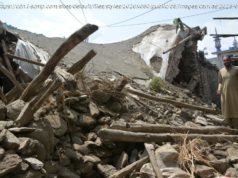Israel said it had launched a major attack after its F-16 came under Syrian fire. The events appeared to be Israel’s first direct engagement with Iranian forces in Syrian territory.
JERUSALEM — Israel clashed with Syrian and Iranian military forces on Saturday in a series of audacious cross-border strikes that could mark a dangerous new phase in Syria’s long civil war.
The confrontations, which threaten to draw Israel more directly into the conflict, began before dawn when Israel intercepted what it said was an Iranian drone that had penetrated its airspace from Syria. The Israeli military then attacked what it called the command-and-control center from which Iran had launched the drone, at a Syrian air base near Palmyra.
On its way back from the mission, one of Israel’s F-16 fighter jets crashed in northern Israel after coming under heavy Syrian antiaircraft fire. It is believed to be the first Israeli plane lost under enemy fire in decades.
That prompted a broad wave of Israeli strikes against a dozen Syrian and Iranian targets in Syrian territory. The Israeli military said it hit eight Syrian targets, including three aerial defense batteries, and four Iranian positions that it described as “part of Iran’s military entrenchment in Syria.”
The events, including Israel’s direct engagement with Iranian forces, threatened to intensify the crisis in Syria and showed the extent to which the country has become a battlefield between Israel and Iran, bitter foes in the region.
“This is indeed a dangerous escalation that raises the specter of direct conflict between Israel and Iran in Syria — a far more serious situation than the drawing of red lines and tit-for-tat exchanges that have occurred before,” said Robert Satloff, executive director of the Washington Institute for Near East Policy.
Forces from Russia, Turkey and the United States are also on the ground in Syria in a war with multiple fronts and multiple factions, including the remnants of the Islamic State and other Islamist militant groups.
In the past week, aircraft from three foreign countries have been brought down in the conflict: the Israeli plane; a Turkish helicopter shot down, also on Saturday, as it attacked Kurdish militias; and a Russian plane over Idlib that was bombing rebel-held territory.
Israel has long warned about the risk of conflict as Iranian forces and their allies, including Hezbollah, the Lebanese militant group, have dug in on Syrian territory and approached the boundary with the Israeli-held portion of the Golan Heights. Israel, which considers Iran its most potent enemy in the region, has been lobbying world powers to push these forces from the border areas.
Israel has carried out scores of strikes in Syria in recent years, largely targeting what it says are advanced weapons stores or convoys taking weapons to Hezbollah in neighboring Lebanon. Israel has also reportedly hit Syrian government facilities involved in weapons development and an Iranian base under construction in Syria.
But this was the first Israeli strike on a site where Iranian forces were present, analysts said, and Israeli military officials said this was the first time an Iranian drone had penetrated Israeli airspace during the Syrian war. There was no immediate indication that the drone was armed.
Israeli military officials accused the Syrians and Iranians of “playing with fire,” but indicated that Israel wanted to contain the situation.
“We are ready to exact a very heavy price from whoever acts against us,” said Brig. Gen. Ronen Manelis, the chief spokesman of the Israeli military, “but we are not seeking an escalation.”
The jet crash represented a severe blow to Israel’s prestige and could mark a major change after years in which it acted against targets in Syria with relative impunity.
In the past, Syria has claimed, falsely, that it had shot down Israeli aircraft. The last time an Israeli jet was downed under enemy fire appears to have been in the early 1980s.
Hezbollah said on Saturday that the downing of the Israeli F-16 jet by the Syrian Army marked the “start of a new strategic phase,” which would limit Israeli exploitation of Syrian airspace. “Today’s developments mean the old equations have categorically ended,” the Lebanese Shiite group said in a statement.
In Syria, the day’s events were viewed as potential game-changers. Government supporters celebrated in the streets of Damascus, handing out sweets and hailing Mr. Assad and the army.
This is the first time the Syrian government appears to have made good on promises to shoot down Israeli aircraft, after years of threats against both Israel and the other international militaries that have flown sorties over Syria without permission.
“I am so happy,” said Haidar, 30, a government supporter, as he handed out sweets downtown. “It makes me proud to see a Syrian response, shooting down the Israeli F-16. For years we have been waiting for a Syrian reaction against the Israeli violations and airstrikes.”
But just as Syrian self-confidence appears to have grown, Israel also sent a strong message with its broad wave of strikes on Saturday, Israeli analysts said. They noted that this was the first time in recent years Israel had struck Syrian territory in broad daylight and said that Israel had inflicted serious damage on Syria’s air-defense system. Despite more Syrian antiaircraft fire, all Israeli jets returned to base safely from the second mission, after the first jet was lost, according to the Israeli military. Syria is believed to have fired at least a dozen antiaircraft missiles, with the wreckage of one landing in Lebanon.
It was not immediately clear if the Israeli F-16 was directly hit by the Syrian antiaircraft fire. Early assessments suggested that it was, said Lt. Col. Jonathan Conricus, another spokesman for the Israeli military, though he added that nothing had been officially confirmed.
The Israeli military said two pilots had bailed from the downed aircraft “as per procedure.” One pilot was severely injured.
Prime Minister Benjamin Netanyahu of Israel spent much of Saturday in consultations with his defense minister, the Israeli chief of staff and other military officials.
Russia, along with Iran, has been helping prop up the government of President Bashar al-Assad in Syria, and the Russian Foreign Ministry issued a statement calling on “all sides involved to show restraint and avoid all acts that could lead to complicating the situation further.”
The ministry added: “It is absolutely unacceptable to create threats to the lives and security of Russian soldiers that are in the Syrian Arab Republic on the invitation of the legal government to assist in the fight against terrorism.”
After a meeting with President Vladimir V. Putin in Moscow two weeks ago, Mr. Netanyahu said in a statement that Israel viewed with “utmost gravity” Iran’s efforts to establish a military presence in Syria, and said he had made clear to Mr. Putin that Israel would “act according to need.”
Mr. Netanyahu said he spoke with Mr. Putin on Saturday and agreed that security coordination between the two countries would continue. The Israeli prime minister also said he spoke with Secretary of State Rex W. Tillerson about Saturday’s confrontation.
“The United States is deeply concerned about today’s escalation of violence over Israel’s border,” Heather Nauert, a State Department spokeswoman, said in a statement. “Iran’s calculated escalation of threat, and its ambition to project its power and dominance, places all the people of the region — from Yemen to Lebanon — at risk.”
A Pentagon spokesman, Maj. Adrian J. Rankine-Galloway, said the United States military supported Israel’s right of self-defense.






